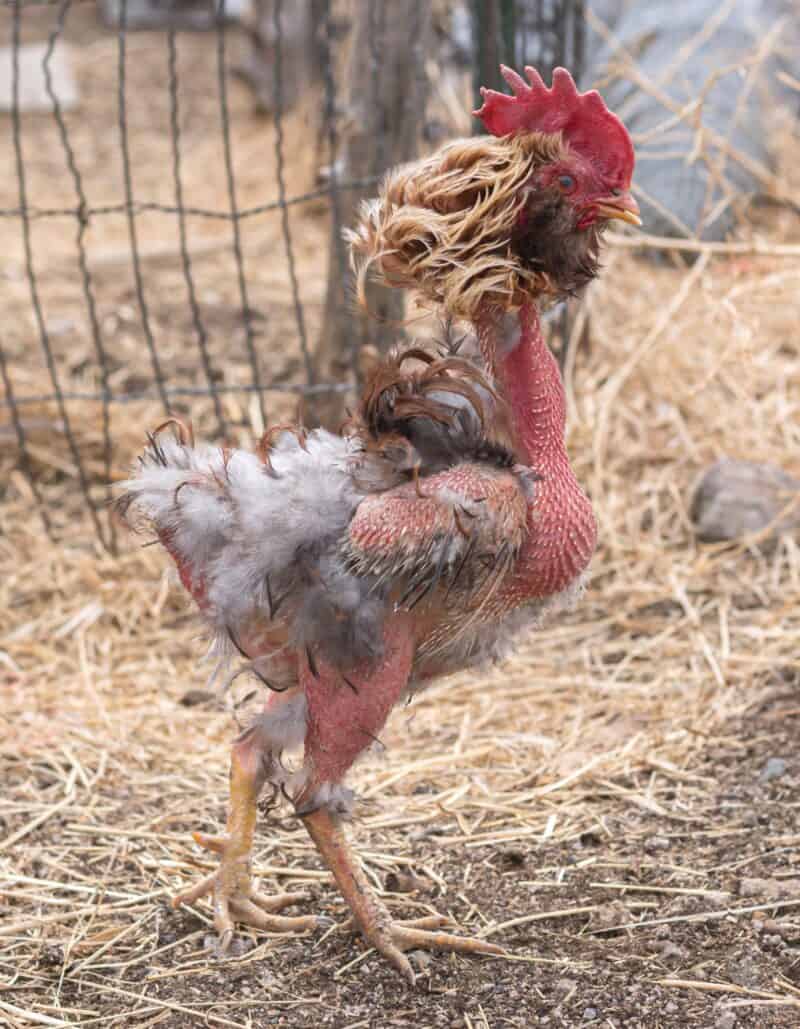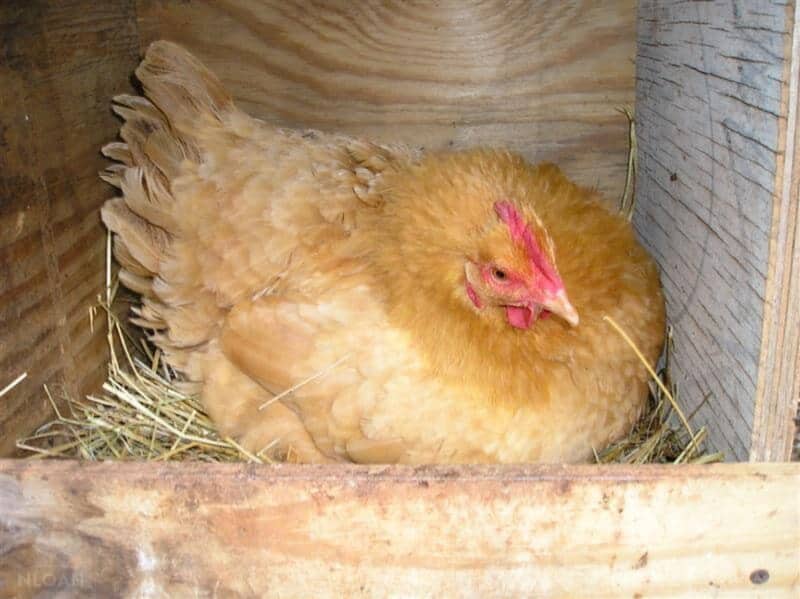Are you losing feathers from your chickens? If so, you’re probably wondering why. Feather loss in chicken is a common occurrence that can arise from a wide range of causes.

From diet to environmental factors, there are plenty of things to consider when diagnosing the cause of your chickens’ feather loss.
Some of them are easy to diagnose, and other causes are far more subtle, but most of the time all of them are preventable with the right approach.
In this article, we will look at 9 possible causes of feather loss and the actions you should take to help your chickens maintain their plumage.
Let’s dive in and explore each factor one by one so that you can get to the root of this problem quickly and be able to take the necessary steps to ensure your flock looks as impressive as ever!
1. Molting
Molting is one of the most common causes of feather loss is also the least cause for alarm.
Molting is a natural process in chickens where they lose their old feathers and replace them with new ones.
It usually occurs at least once a year, but some chickens may run late and technically “skip” a calendar year.
During the molting process, chickens will first begin to lose feathers around the neck, tail, and wings before the entire body is affected.
The new feathers will usually appear shortly after the old ones are shed and should be fully grown back within 4-12 weeks.
It’s important to note that during this period of time, your chickens may become more vulnerable to stressors and predators as they will have less protection from these elements due to their lack of feathers.
2. Predator Attack
A predator attack is another common cause of feather loss, but sadly one that is far more traumatic than molting.
If your chickens have been attacked by a wild animal (or even a pet), you will probably see that their feathers are missing in patches.
This assumes they survive the ordeal; much of the time a wild predator will kill and carry off a chicken to be consumed at leisure, leaving only blood and feathers behind for you to find.
Depending on exactly what happened and what kind of predator is responsible, this type of damage can be difficult to diagnose.
You’ll want to carefully examine the affected bird to check for life-threatening injuries, but if they are lucky they will have only had some feathers torn out- a near miss!
Note that more serious injuries might prevent some feathers from re-growing at all.
If you suspect that your chickens have been attacked by a predator then it’s important to make sure they are safe and secure so that it doesn’t happen again.
Look around for evidence of what kind of animal did it and then take the necessary steps to stop a reoccurrence. Make sure to reinforce the coop with mesh or other anti-predator measures if necessary.
3. Mating
For new chicken owners, this is probably the ugliest reason chickens, specifically hens, wind up losing feathers.
Chicken mating practices are super rough, bordering on brutal: male chickens will grab onto the hens and hold them down with their claws while they peck away at them, thrashing them something awful.
This behavior can result in significant feather loss to the point of baldness, particularly around the neck, hindquarters, and wings of the hen. Sometimes hens get genuinely injured!
Don’t even think of trying to incentivize the rooster to play nice, or to moderate the chickens’ behavior, because this is just the way it is.
But if you notice that a particular rooster is being way too brutal on your hens then it might be time to consider finding him a new home or even culling him if necessary.
Some owners go so far as to equip their hens with special “saddles” which are little capes or vests designed to absorb some of the punishment inflicted during mating.
Any other time, if you are looking to keep your hens’ feathers intact then it is important to limit male-female interaction within your flock as much as possible when mating is not required for your purposes.
4. Infighting
Another sad and shocking but normal reason chickens will lose feathers, a few or a lot, is due to infighting.
Squabbling, sparring, establishing the pecking order, whatever you want to call it, chickens often fight among themselves, particularly in the case of roosters squaring off to see who is top dog, er, bird.
The most common target of their aggression when a fight is “social” is usually the feathers, which they will yank out with their beaks. As is often said, you will literally see feathers flying when chickens are fighting!
Eliminating this cause can be complicated, though. Chickens have complex social structures modified by inherent traits and environmental pressures.
Use a holistic approach and have enough space for your chickens to prevent overcrowding, make sure there is plenty of food and water, and plenty of feeding stations.
Multiple roosters must establish their hierarchy, but if they don’t settle down one or all might need to be put in a rooster colony.
New additions to the flock, especially if of a different breed, might be harassed or even killed.
Naturally, the breed of the chickens is inherently important as some are just far more aggressive and fight-prone than others.
Chickens are also individuals, and some birds just might not normally get along.
5. To Line a Nest
Laying hens, especially ones that are going broody, will often pluck out feathers from their breast and belly.
They do this to line the nest area and make themselves a cozy bed in which to lay their eggs, but also to increase the amount of body heat that warms the eggs directly.

This is another entirely natural and normal but still alarming cause. It means a hen looks a little weird when walking around, but this is otherwise harmless and she will re-grow her feathers in time.
However, you will want to stay vigilant just to be sure that the real cause of her plucking is not something else. See below.
6. Illness
Disease, especially severe or chronic ones, is sometimes responsible for feather loss as a chicken’s body focuses on survival more than anything else.
This kind of feather loss tends to be symmetrical and is usually accompanied by other signs of illness such as reduced appetite, lethargy, or changes in behavior.
If you suspect a chicken is ill, the best course of action here is to immediately separate the affected bird from the rest of the flock to prevent the spread of disease and get it treated by a veterinarian if possible (which might not always be practical!).
If you can identify and treat whatever illness is causing the issue then hopefully your feathered friend can make a full recovery and grow new feathers.
7. Parasite Infestation
This is a cause of feather loss that every chicken keeper will deal with at some point. Mites, lice, ticks, and other chicken parasites can set up shop on your birds and cause terrible itching and irritation for them.
As wounds develop or as chickens scratch themselves to try and dislodge the little buggers their feathers will start to come out!
Fortunately, this is relatively easy to treat if you know what you are dealing with. A good dust bath and chicken-safe pesticide treatment should do the trick for most common feather mites, feas, or lice.
Some species might require something a bit stronger. Your local vet or pet store should have any medications that you need.
Keep in mind that serious infestations of blood-sucking parasites might lead to anemia and other systemic issues that can cause mass loss of feathers, so make sure you treat it seriously and consult a vet if at all possible.
8. Stress
It is said people tear their hair out when stressed, and chickens tear their feathers out.
It is true that chronic stress can lead to some major behavioral issues with chickens plucking out their feathers for no apparent reason.
Identifying and fixing this issue requires you to look at your own management and their situation:
- Are they getting enough food?
- Enough space?
- Is there a rooster harassing them or bullying other birds in the flock?
- Does a rooster have access to mates?
- Are they heat or cold stressed?
- Poor nutrition can also lead to stress or to feathers falling out due to nutritional deficit.
Stressful conditions like these will need to be addressed until feather loss stops and normal, healthy behavior resumes. Affected birds might literally pluck themselves to death otherwise!
9. Preening
Yet another entirely normal cause of feather loss, but usually only a few at a time. Chickens are fastidious when it comes to maintaining their feathers and keeping them in tip-top condition.
This is a good sign, as it means your birds are healthy enough to care for their appearance, but it can be worrying when you see a few feathers come out in the process.
In most cases, preening is nothing to worry about, as your birds will try to remove obviously broken or badly mauled feathers, and some feathers just seem to fall out on their own.
Only investigate further when you notice excessive self-plucking as described above.
Tom has lived and worked on farms and homesteads from the Carolinas to Kentucky and beyond. He is passionate about helping people prepare for tough times by embracing lifestyles of self-sufficiency.
